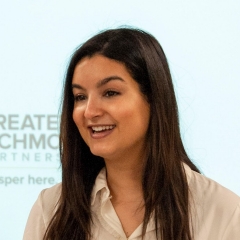International Business (BComm)
Virtual information sessions
Unlock the potential of business education at the John Molson School of Business with our virtual info sessions. Learn about our undergraduate programs, career prospects and what makes us unique. Designed for future business students, these sessions will give you insight into the advantages of studying at John Molson.
Why study International Business?
Reserve a seat in our business class, and you’ll be prepared to work anywhere in the world.
International Business students study commerce with a global perspective. In addition to examining management, marketing and finance in international contexts, courses draw insights from experts in the fields of politics, economics, and sociology.
You’ll acquire international street sense, adapting business models to differing workplaces, planning for cross-border tax, banking or legal issues, understanding trade dispute contexts, or addressing cultural sensitivities in global marketing campaigns.
Opportunities to practise real cultural exchanges exist inside and outside the classroom. Montreal, a multilingual and multicultural city, is the perfect place to pick up a second (or third) language. And John Molson School of Business students hail from more than 100 countries: nearly a fifth are francophone and a quarter speak a language other than English or French as their mother tongue.
International Business will allow you to do business in the global marketplace, make ethical decisions in an international context, and motivate consumers from different cultures.
Program highlights
- Opportunities to travel and study internationally through the John Molson International Exchange program, Community Empowerment Education Development (CEED), and the International Community Outreach Program
- Unique program as the Major courses are multidisciplinary, including courses in Management and Political Science
- Graduate with two degrees by double majoring at the NEOMA Business School in France
Special funding for out-of-province students
Up to $4000 for undergraduate programs.
Program structure
Program options
A Bachelor of Commerce degree takes a minimum of three or four years (90 – 120 credits) of full-time study, depending on your academic background. All John Molson School of Business students follow a core business curriculum coupled with a John Molson School of Business major, which may be combined with a minor in another discipline or any combination of elective courses that interest them.
- Core business courses (48 credits)
- International Business major courses (24 credits)
- Electives (18 credits) which may include a business minor (12 credits)
A Minor in International Business (12 credits) is only available to John Molson School of Business students already in the program. A minor will fulfil the 12 elective credits in your BComm and complement your major field of study.
Courses
Co-op program
The Co-op program offers you a practical approach to learning about exporting goods and services. During your paid work terms that last 12 to 16 weeks, you have the opportunity to deal with the challenges of a complex multicultural and multilingual marketplace, and are exposed to the legal implications of operating within a global environment.
Work terms make it possible for you to:
- Perform on-site audits of international standards procedures and implementation
- Study the implications and repercussions of international policy change on domestic and international markets
- Source, allocate and distribute local and international industrial materials
- Make short- and long-term forecasts for product sales and competition in key markets
United States students: A U.S. Federal Student Aid-eligible version of this program is offered. This version meets all U.S. regulations (such as no co-operative education or e-courses) for eligible programs.
Admission criteria
Minimum cut-off averages and course requirements
- Quebec CEGEP: 27 overall, 26.5 math
- Pre-university:
- Average of 26.5 from Calculus 1 and Linear Algebra
- Applicants are eligible for admission once they have completed at least one of these two math courses. The other must be completed during the first year at Concordia.
- Strongly recommended that applicants complete both courses at CEGEP
- Professional/technical:
- Those completing a technical DEC in a business-related field may be eligible for admission.
- Students who have completed Calculus I and/or Linear Algebra must achieve an average of 26.5 in mathematics.
- Student without Calculus 1 or Linear Algebra, must have achieved a minimum of 75% in Secondary 5 Math (SN, TS or MATH 536). Your high school Quebec Achievement Record must be included with your application. If admitted, you will be required to complete all missing prerequisite courses as elective credits at John Molson.
- Additional information for CEGEP applicants
- Pre-university:
- High School: B overall, B in math
- One math from Pre-Calculus, Calculus, or equivalent
- Canadian curricula course requirements
- Accepted international qualifications
- ACT or SAT is not required
- AP exams are not required but may qualify you for advanced standing
- International Baccalaureate (IB) diploma: 29 overall, 4 HL or 5 SL math
- one math (Applications and Interpretations HL, Analysis and Approaches HL or Analysis and Approaches SL)
- International Baccalaureate Career-related Programme (CP): 29 overall, 4 HL or 5 SL math
- Baccalauréat français: 13 overall, 13 in math
- Required courses:
- Première : Spécialité mathématiques
- Terminale : Mathématiques complémentaires (Spécialité mathématiques recommended)
- Additional information for Baccalauréat français applicants
- Required courses:
- British system of education (GCE):
- A-levels: At least two A-level exams CC, C in math or
- AS-levels: At least 4 AS-level exams with equivalent results or
- BTEC: Level 3 Diploma or Extended Diploma in a related subject area with equivalent results
- Students without A-level math may be admissible based on AS-level or iGCSE/GCSE/O-Level exam results. Students should include all their exam results from iGCSE (or equivalent) onwards to support their application.
- Additional information for British System of Education (GCE) applicants
- University transfers (internal): 2.7 overall, 2.7 in math
- ECON 201, ECON 203 (or have exemptions)
- MATH 208 and MATH 209 (or have exemptions)
- Additional information on Internal Degree Transfer
- University transfer (external): B- overall, B- in math
- Courses in the disciplines of Calculus and Linear Algebra
Minimum cut-off averages should be used as indicators. The cut-off data may change depending on the applicant pool. Applicants who meet the stated minimum requirements are not guaranteed admission to these programs.
Application deadlines
It’s not too late to apply
Most undergraduate programs are still accepting applications for fall 2025.

FALL ENTRY (September)
Deadline: March 1
International applicants: Apply no later than February 1 to allow time for immigration document processing. However, applying earlier is strongly recommended. Immigration processing times vary by country, and delays could prevent you from starting your studies on time.

WINTER ENTRY (January)
Deadline: November 1
International applicants: Apply no later than August 1 to allow time for immigration document processing. However, applying earlier is strongly recommended. Immigration processing times vary by country, and delays could prevent you from starting your studies on time.
We reserve the right to close admission to a program at any time after the official deadline without prior notice.
Student story

Léonard Barrette
Major in International Business
Minor in Modern Chinese Language and Culture
Double Degree with NEOMA Business School
For Léonard Barrette, double majoring at the NEOMA Business School in France while completing his Commerce degree at Concordia was a no-brainer.

Fatima Halimi
Major International Business (Co-op) Minor Political Science
The first piece of advice I have is to start building your resume as soon as you can.
Other programs of interest

Finance is a competitive program where you acquire the skills to manage money and practice making decisions that affect the futures of corporations, communities and investors.
Department
Faculty

The future leaders who come to our school inspire people, embrace diversity, build new business models and create wealth in socially and ecologically sustainable ways. As a JMSB student, you achieve these goals by taking an integrated approach to management studies.
Department
Faculty

At the John Molson School of Business, our economics major is applied. Because we look at the world though a business lens, you don’t just analyze data to discover how society, politics and the environment interacts with business, you also develop business strategies and organizational tactics to tackle economic problems big and small.
Faculty
© Concordia University


